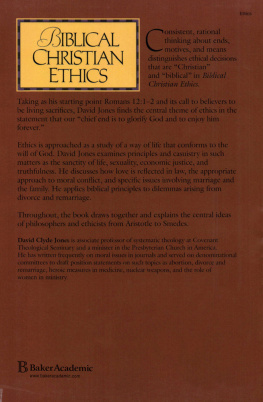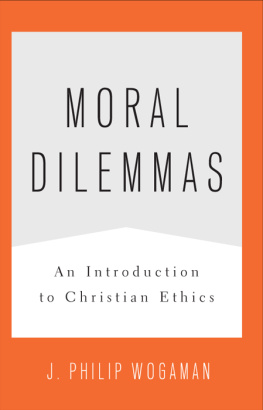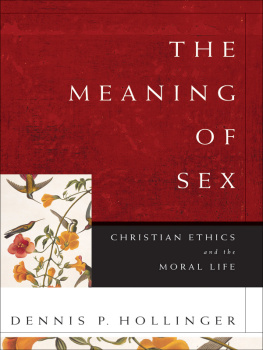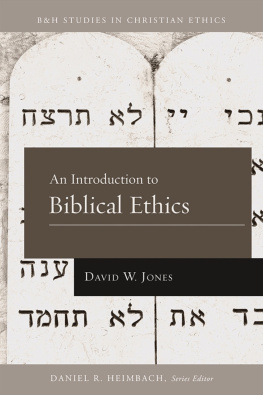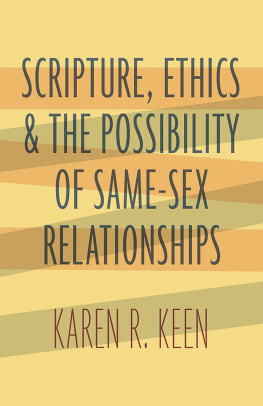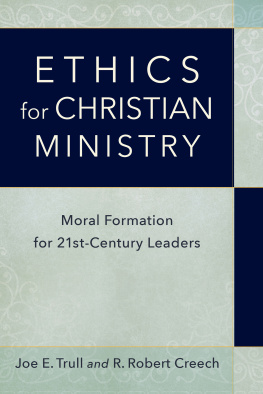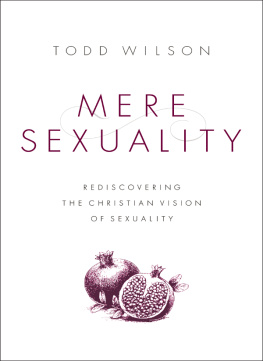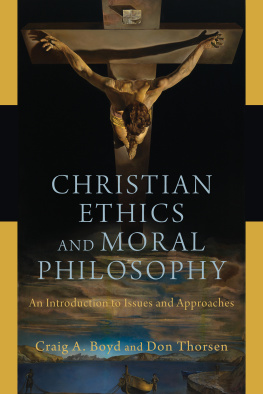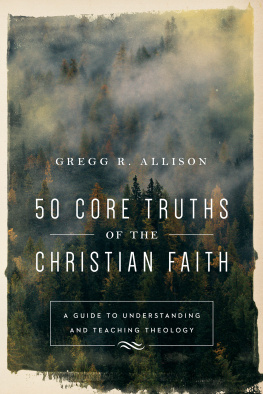David Clyde Jones - Biblical Christian Ethics
Here you can read online David Clyde Jones - Biblical Christian Ethics full text of the book (entire story) in english for free. Download pdf and epub, get meaning, cover and reviews about this ebook. year: 1994, publisher: Baker Publishing Group, genre: Religion. Description of the work, (preface) as well as reviews are available. Best literature library LitArk.com created for fans of good reading and offers a wide selection of genres:
Romance novel
Science fiction
Adventure
Detective
Science
History
Home and family
Prose
Art
Politics
Computer
Non-fiction
Religion
Business
Children
Humor
Choose a favorite category and find really read worthwhile books. Enjoy immersion in the world of imagination, feel the emotions of the characters or learn something new for yourself, make an fascinating discovery.
- Book:Biblical Christian Ethics
- Author:
- Publisher:Baker Publishing Group
- Genre:
- Year:1994
- Rating:3 / 5
- Favourites:Add to favourites
- Your mark:
- 60
- 1
- 2
- 3
- 4
- 5
Biblical Christian Ethics: summary, description and annotation
We offer to read an annotation, description, summary or preface (depends on what the author of the book "Biblical Christian Ethics" wrote himself). If you haven't found the necessary information about the book — write in the comments, we will try to find it.
Biblical Christian Ethics — read online for free the complete book (whole text) full work
Below is the text of the book, divided by pages. System saving the place of the last page read, allows you to conveniently read the book "Biblical Christian Ethics" online for free, without having to search again every time where you left off. Put a bookmark, and you can go to the page where you finished reading at any time.
Font size:
Interval:
Bookmark:

1994 by David Clyde Jones
Published by Baker Academic
a division of Baker Publishing Group
P.O. Box 6287, Grand Rapids, MI 49516-6287
www.bakeracademic.com
Ebook edition created 2013
All rights reserved. No part of this publication may be reproduced, stored in a retrieval system, or transmitted in any form or by any meansfor example, electronic, photocopy, recordingwithout the prior written permission of the publisher. The only exception is brief quotations in printed reviews.
Library of Congress Cataloging-in-Publication Data is on file at the Library of Congress, Washington, DC.
ISBN 978-1-4412-0656-5
Unless otherwise indicated, Scripture is taken from the Holy Bible, New International Version. NIV. Copyright 1973, 1978, 1984 by Biblica, Inc. Used by permission of Zondervan. All rights reserved worldwide. www.zondervan.com
Contents
Preface
M y father, who grew up on a small red-clay farm in the South Carolina Piedmont before he turned to dry-goods for a living, used to love to tell the story about the county farm bureau agent who took a bunch of brochures on contour plowing, crop rotation, and the like to a farmer in his district, handed them to him, and said, Here, read these; theyll improve your farming. The farmer took them, looked them over, handed them back, and said, Shucks, I aint farming now as good as I know how.
A book on Christian ethics is supposed to help us improve our living, but if the truth were confessed, were not living now as well as we know how. Our crucial lack is not information. Unless the Holy Spirit breathes life into our bones, we will remain on the valley floor, disjointed and very dry. Still, the Spirit works by and with the Word, and a fuller vision of what God is calling us to be and to do may be instrumental in motivating us to seek improvement in the Christian life. In that hope I offer my brochures, such as they are.
The title Biblical Christian Ethics is intended to underscore the unity of theology and ethics. Given the evangelical assumption that the holy Scriptures of the Old and New Testaments are the only infallible rule of faith and practice, the Bible is the source and norm of Christian ethics as well as Christian doctrine. On this view ethics and dogmatics are not properly separate disciplines but integral parts of the whole study of Gods revelation of himself and his will for humankind. Christian ethics is properly a subdivision of systematic theology; it could be called the doctrine of the Christian life.
When I first started teaching theological ethics some twenty years ago, the organizer of a conference on Christianity and politics asked me in casual conversation who had been the most formative influence on my ethics. Taken off guard I facetiously replied, Moses. The truth is I was embarrassed to admit I hadnt read that widely in the field and furthermore couldnt tell how I had been influenced by what I had read. Now I would say that I follow the Reformed tradition in ethics, especially Augustine on the goal of the Christian life, Calvin on its norms, and Jonathan Edwards on its motive. In addition, I have sought to listen carefully to evangelical Lutherans on the proper distinction between law and gospel, and I admit to an admiration for the structural analysis of Thomas Aquinas, though I make no claim to being more than a peeping Thomist, as the saying goes.
Confessionally I am committed to that remarkable committee report published in 1647 as The Humble Advice of the Assembly of Divines, Now by Authority of Parliament Sitting at Westminster, Concerning a Confession of Faith , known since as the Westminster Confession of Faith. According to its own principles it is not to be made the rule of faith, or practice; but to be used as a help in both (31.4). Citations from the Confession and its companion catechisms are made in that light.
Special thanks to the board of trustees of Covenant Theological Seminary for their generous sabbatical policy, which enabled me to write this book. Also to John W. Sanderson, Jr., my teacher, colleague, and friend (who got me into ethics in the first place when he was chairman of the systematics department at Covenant) for reading the first seven chapters on foundations and making numerous valuable suggestions. And to Sue Ellen Bilderback Jones, my intimate life companion and committed partner in ministry, who shares my hopes, calms my fears, encourages my writing, andas an English teacher and moregenerally improves my style. But though she tells me I cant use a double modal, I still say I might could.
Abbreviations
| ASV | American Standard Version |
| GNB | Good News Bible |
| JB | Jerusalem Bible |
| KJV | King James Version |
| LXX | Septuagint |
| NAB | New American Bible |
| NASB | New American Standard Bible |
| NEB | New English Bible |
| NIV | New International Version |
| NRSV | New Revised Standard Version |
| RSV | Revised Standard Version |
| TEV | Todays English Version |
The Questions of Ethics
W hat goals ought we to pursue in life? What sort of persons ought we to be? What practices ought we to follow? These are the great questions the discipline of ethics seeks to answer.
The questions imply that human conduct is subject to a threefold evaluation from a moral point of view. First, the end the agent seeks to realize must be good, intrinsically worthy of human pursuit. Second, the motive of the agent must also be good, so that the end is sought because it is worthwhile, the mark of a good character. Third, the means to the end must be good, conforming to the standard of what is right, since neither a good end nor a good motive is compatible with a bad means. For conduct to be morally praiseworthy it must be good in all three respects, not least because end, motive, and means are not finally separable.
Moral evaluation, of course, implies standards of judgment. Ends are judged good or evil by criteria of intrinsic value; agents are judged good or bad by criteria of moral virtue; actions (including mental acts or attitudes) are judged right or wrong by criteria of moral obligation. What are these criteria, and how do we know them? This is the most pressing question of ethics; no particular instance of ethical choice can be resolved without presupposing an answer to it. The answer is necessarily dependent upon some broader philosophical perspective, some view of human beings and their place in the universe.
From a biblical point of view, the question of criteria for goals, persons, and practices comes down to this: What is God calling us to be and to do? Since Gods salvific call is not a bare invitation but a manifestation of his sovereignty and power, the question is more fully: What is God summoning and enabling us, his redeemed people, to be and to do?
By including obedience within the definition, Hoekema draws our attention to the goal-directed aspect of effectual calling that often emerges in the New Testament. We are called to salvation by the sanctifying work of the Holy Spirit and belief of the truth so that we may share in the glory of our Lord Jesus Christ (2 Thess. 2:1314). The ultimate goal of our calling is eternal life (1 Tim. 6:12), the heavenly prize (Phil. 3:14), Gods kingdom and glory (1 Thess. 2:12). We are called to belong to Christ (Rom. 1:6), and since our calling brings us into fellowship with him (1 Cor. 1:9), we are called to live a holy life (1 Thess. 4:7) and to follow his example of suffering for righteousness sake (1 Pet. 2:21).
Next pageFont size:
Interval:
Bookmark:
Similar books «Biblical Christian Ethics»
Look at similar books to Biblical Christian Ethics. We have selected literature similar in name and meaning in the hope of providing readers with more options to find new, interesting, not yet read works.
Discussion, reviews of the book Biblical Christian Ethics and just readers' own opinions. Leave your comments, write what you think about the work, its meaning or the main characters. Specify what exactly you liked and what you didn't like, and why you think so.

